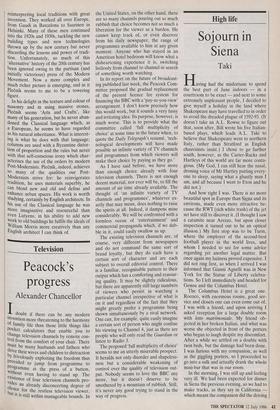Television
Peacock's progress
Alexander Chancellor
doubt if there can be any modern invention more threatening to the harmony of family life than those little things like pocket calculators that enable you to change television channels by remote con- trol from the comfort of your chair. There must be many husbands and fathers who drive their wives and children to distraction by frivolously exploiting the freedom thus provided to jump from programme to programme at the press of a button, without even having to stand up. The existence of four television channels pro- vides an already disconcerting degree of choice for the restless television viewer, but it is still within manageable bounds. In the United States, on the other hand, there are so many channels pouring out so much rubbish that choice becomes not so much a liberation for the viewer as a burden. He cannot keep track of, or even discover from his daily newspaper, the range of programmes available to him at any given moment. Anyone who has stayed in an American hotel bedroom will know what a disheartening experience it is, switching listlessly from channel to channel in search of something worth watching.
In its report on the future of broadcast- ing published last week, the Peacock Com- mittee proposed the gradual replacement of the present licence fee system for financing the BBC with a 'pay-as-you-view' arrangement. I don't know precisely how this would work, but it sounds a very fussy and irritating idea. Its purpose, however, is much worse. This is to provide what the committee called 'full multiplicity of choice' at some time in the future when, to quote the Daily Telegraph's resume, 'tech- nological developments will have made possible an infinite variety of TV channels and programmes from which viewers will make their choice by paying as they go.'
As I have said before, we have more than enough choice already with four television channels. There is not enough decent material, nor ever will be, to fill the amount of air time already available. The thought of 'an infinite variety of TV channels and programmes', whatever ex- actly that may mean, does nothing to raise the spirits at all. Indeed, it dampens mine considerably. We will be confronted with a formless ocean of 'entertainment' and commercial propaganda which, if we dab- ble in it, could easily swallow us up.
The existing television channels are, of course, very different from newspapers and do not command the same sort of brand loyalty, but they do each have a certain sort of character and are each subject to overall editorial control. There is a familiar, recognisable pattern to their output which has a comforting and reassur- ing quality. It may be slightly ridiculous, but there are apparently still large numbers of viewers who persist in watching a particular channel irrespective of what is on it and regardless of the fact that they might greatly prefer a programme being shown simultaneously by a rival network. One can, for example, quite easily imagine a certain sort of person who might confine his viewing to Channel 4, just as there are people who will only read the Guardian or listen to Radio 3.
The proposed 'full multiplicity of choice' seems to me an utterly miserable prospect. It heralds not only disorder and shapeless- ness but a considerable weakening of control over the quality of television out- put. Nobody seems to love the BBC any more, but it doesn't deserve to be smothered by a mountain of rubbish. Still, it's never any good trying to stand in the way of progress.


















































 Previous page
Previous page